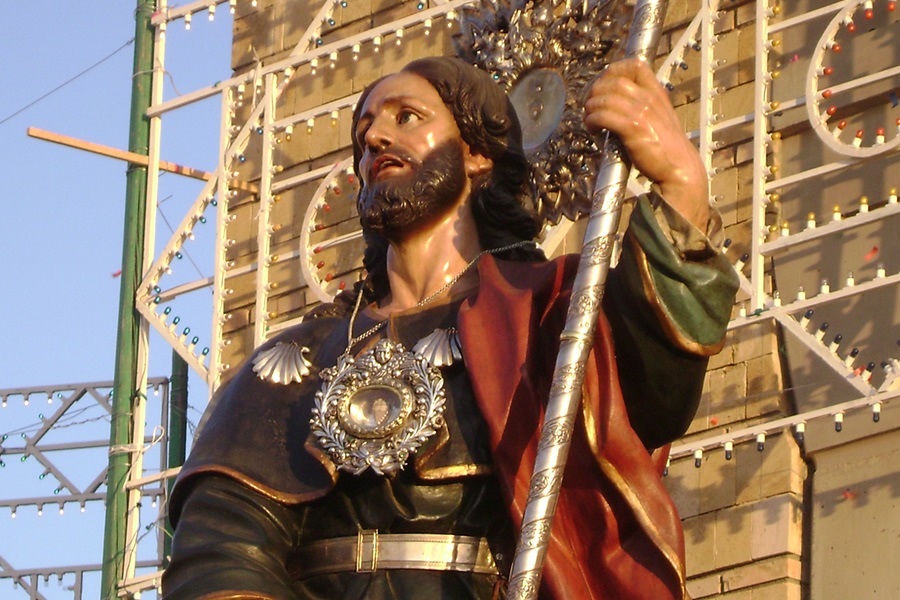
Love One Another
09-27-2020Pastoral ReflectionsFr. BrianThere is an important message for all of us that applies to our entire life in this weekend’s scripture. We are being advised to not live in the past with any of its negative ways, but to live in the present in a changed and healthy way. Clinging to the past with any of its wrongs or flaws limits us and ultimately can destroy our very being. The courage or valor to change what was wrong to what is right is essential to living a healthy and faithful Christian life. Our scripture this weekend encourages us to change and grow as we need to in life.
The prophet Ezekiel who spoke the message of God during the Babylonian Exile clearly informed the Jewish people that they were responsible for their own actions. He blatantly told them they had failed to accept these responsibilities and always tried to blame their separation from God on other people, namely on their ancestors. They always had excuses for their behavior and never failed to blame their problems on the sinfulness of the many generations before them. Ezekiel boldly challenged them to live in the present time of their lives and take responsibility for their own actions now and also to do what they knew was right regardless of past events.
READ MORE
Live-streamed Masses
09-25-2020Letters From Fr. BrianRev. Brian F. ManningDear Parishioners and Friends of Saint Mary’s,
Our Parish is moving along with the flow of life. I notice each week a few more folks are coming to weekend Masses. Please remember we are here ready to welcome you whenever you return. What is wonderful news is almost 1000 people (or technically views) saw our three Confirmations on Live Stream or on our You-tube channel. (“St. Mary Franklin Live Stream” is its name) Usually over 120 people (views) watch our Saturday 4 PM Mass. We will be adding this weekend the 10:30 AM Sunday Mass so that you may see it in “real time” on our Live-stream.
READ MORE
Generous and Forgiving
09-20-2020Pastoral ReflectionsFr. BrianThere are many themes in this weekend’s scripture and one of them is that life does not work out equally for everyone. Life is not distributed to everyone in equal parts at the same time. We are all proud believers in egalitarianism for one and all, yet we know that in many ways life rolls ours differently for each person. There is in life some randomness if badness that is not the result of malfeasance or sin takes place. And more importantly, there is some randomness of goodness in our lives that we cannot justify or explain. It is very difficult in life to sort through the many complaints people have. We are biased by our personal histories and so is the complainer. We tend to remember our negatives and nurse them along in our lives and often miss seeing or valuing the many good things that we have. We often carry resentments and grudges quite tightly to our hearts and very rarely carry gratitude and appreciation in the same way. The larger theme of this weekend is how we see life.
READ MORE
Weather Changes
09-18-2020Letters From Fr. BrianRev. Brian F. ManningDear Parishioners and Friends of Saint Mary’s,
Pride prevented me from turning on the heat this morning when I saw that the indoor temperature had dropped to below 60 iu the Rectory. These few mornings of coolness can make us think that there is no more summer weather to arrive. This is, however, New England and some heat will surely return. Hopefully the heating season starts closer to early November. One of the Almanacs that people read says we will have a snowy winter, another says the opposite. None of us “control the weather” although we must pay attention and respond to the Climate Change crisis throughout the world.
READ MORE
Forgive
09-13-2020Pastoral ReflectionsFr. BrianOur first reading this weekend is a fitting foundation for the Gospel of this Sunday. This passage from the Book of Sirach is a strong platform on which an understanding of our Gospel selection can be built. Sirach was a sacred book that was composed roughly 200 years before the time of Jesus. It was the son of Sirach who wrote this book in an attempt to help the Jews of then live in peace and harmony in the world of their day. He had much to tell them. He told them to let go of anger, as many of them held on tightly to this negative emotion. To them, anger seemed valuable, even when it was not. More importantly, he tells them our sins will be forgiven if we forgive others and, as importantly, we must show mercy in order to receive it.
In our Gospel passage, the Lord Jesus shows this great wisdom of Sirach when his follower Peter asks how often we need to forgive someone who has hurt us. In the story told by Jesus, we learn the king forgave the enormous debt of his servant, but the servant demanded payment and punishment when a fellow slave could not pay what he owed. Clearly we are to be like the king.
READ MORE
Start of Religious Education
09-11-2020Letters From Fr. BrianRev. Brian F. ManningDear Parishioners and Friends of Saint Mary’s,
We all stepped along this week to the post Labor Day start-up of our lives. In New England life now takes on a rhythm and vibrancy which was missing in the summer. Education restarts, although this year in a radically different way; sports restart, again in a radically different way; special enrichment programs for our youth start again, some this year in a radically different way and Religious Education starts again in a radically different way.
READ MORE
Humility, understanding, and compassion
09-06-2020Pastoral ReflectionsFr. BrianNostalgia exists for everyone shortly after we start to create and reflect upon our memories. We all remember “the good old days” when we were young(er) and things were different. We remember them as better or as worse than they were. Memory is an emotional intellectual activity when we think about our past. Memorizing the time's table or historical information or data” is different. All generations and cohorts of ages of people think about their past with the same sense of subjective nostalgia. This nostalgic memory influences how and what we think in the presence of ourselves and what we think of others.
The Old Testament prophet Ezekiel and the Gospel writer Matthew tell us that we are obligated to speak up when we see something or someone doing or going wrong. Ezekiel is quite bold and tells that if we fail to correct the person, that person’s fate is considerably our fault. I would say that is a rather great responsibility for most of us. I suspect this is an exaggeration because we cannot control someone else’s free will decision. As we know, many people will never listen and to try to speak to them does far more harm than good. Matthew says the same thing. We are to go directly to the person if something is not right. And he says if that does not work, there is still more to be done according to Matthew’s passage.
READ MORE
Labor Day
09-04-2020Letters From Fr. BrianRev. Brian F. ManningDear Parishioners and Friends of Saint Mary Parish,
Labor Day has arrived. The summer has run its course and now we step forward to begin a new Fall Season which has all sorts of challenging and demands for us. I wish to share with you one memory of Labor which I had in my childhood. On September 5, 1954, I won First Place in the footrace for 5-year-olds in the Sand Hills Scituate MA Annual Labor Day Festivities. (sort of the seaside Olympics!) The One Dollar prize is framed along with the sketch of a little dog and is with me to this day. My memory of the “Great Race” is that my father told me when the whistle blows, I was to start running straight and keep running until you are told to stop. I ran my little legs along the route and was shocked to find out that I actually won. I must say that I have not won any races since then, but it does not matter.
READ MORE
Plan for Fall Religious Education
08-30-2020Letters From Fr. BrianRev. Brian F. ManningDear Parishioners and Friends of Saint Mary’s,
Most of our Town Life is focused on our Educational Plans for our young people. We also still hear about various colleges and universities as they change their plans which may greatly impact some of our highest education young people. It is clear that the Franklin Educational Department is doing its best to plan for our young ones. This is true whether we like or dislike their plans. We must faithfully pray for them and also for the teachers and school personnel as they begin their active Mission of educating our children in the most difficult of circumstances.
READ MORE
With Faith
08-30-2020Pastoral ReflectionsFr. BrianThe COVID Pandemic has certainly had us all experience how fleeting life can be. As time moves on, everything still is constantly changing. Sometimes we observe how things are getting better, and then all of a sudden we hear of “clusters” and “hot spots” and how things must again become immediately more restricted. We are living in a day-to-day period of great instability and uncertainty. Our civil society is in turmoil as it is fractured. The long complex history of racism in our country is at the forefront and should be. The great divide of super wealth and the average American’s income exacerbates everything. Race, class, and income are three areas that collide and cause such turmoil during these days. Our governmental leaders have lost sight of what matters for the people. Their common purpose and vision for all of us are missing. The Common Good for all of us is not held as a primary value.
READ MORE
The Key Is Love
08-23-2020Pastoral ReflectionsFr. BrianNowadays many times our smartphone can open a door. We can use them via apps to open garage, house, or work doors. We no longer need a traditional metal key. In fact, hotels now give arriving guests an electronic card or send them a special code to their phone to a hotel app so that they may use the elevator or open their room. Some homes now use special lock systems that open via Wi-Fi with an app or a special numeric code. Most of us, however, still use traditional keys to open our houses, even if we use a “fob” to open and start our cars. Although metal keys are slowly being replaced, the name and concept of “key” are still very much in common use. I notice sometimes I need “an electronic key” to get into a file or a network system. Keys, whatever type they may be, are meant to provide security and safety. They are to protect and also at the right time to open up. They also strongly represent power. Who controls the key, to whom is it given, who has a Master Key, and who is “allowed to come in”: all these questions and more tell us about the power of keys and who possesses them. The keys of various categories and concepts are very important in our lives.
READ MORE
Back to School
08-21-2020Letters From Fr. BrianRev. Brian F. ManningDear Parishioners and Friends of Saint Mary Parish,
We have rounded the corner of summer and are heading straight towards Labor Day and the start of Fall and the new School Season. These coming days of decision making about your children and school with the complexity of remote learning and proper child care are very upsetting and confusing. Our college and university students also are going through great struggles over their futures. We pray for all of you as you make decisions. We must rely on the strength and grace of the Lord Jesus.
READ MORE
Active Faith
08-16-2020Pastoral ReflectionsRev. Brian F. ManningThe first reading this weekend addresses the Jewish people and, by scriptural interpretation, ourselves, about a common human problem called “insiders and outsiders.” In matters of faith, there is often that human weakness to label people as “good or bad,” or “orthodox or heretical,” or just simply “in or out,” or, in a sense as “true Catholics or bad Catholics.” In religious circles, this decision is often based on membership in an elite or selective religious group. This first passage tells us clearly that what it should be based on is a person’s attitude of faith, not on a real or imaginary membership card to a special society. Oftentimes this drive to have an exclusive faith has many unwritten rules with self-appointed leaders. The rules usually involve extreme pietistic or ascetic practices directed by leaders who are arbitrary and often capricious in their treatment of their members. The prophet Isaiah in this passage reminds us that God is not exclusionary, but God is always welcoming and open to one and all. Indeed, the house of God “shall be called a house of prayer for all peoples.”
READ MORE
Faith Formation for the Coming Year
08-14-2020Letters From Fr. BrianRev. Brian F. ManningAnother week has passed in this quite hot and sunny summer. I much prefer this heat and humidity to the winter’s cold and ice. New England is not really known for a steady temperate weather pattern at any time of year. I think the constant and sudden weather changes help us to be a little more sturdy and reliant as people. Certainly in this time of the Pandemic we need to have substance and strength. Our God will provide us with this as we step into each day to deal with all the difficulties and worries that come to us. Life is not easy or smooth these days. Putting one foot forward at a time and doing our best actually will achieve a lot of good for everyone.
READ MORE
Focused on Jesus
08-09-2020Pastoral ReflectionsFr. BrianAt Mass this weekend our opening prayer reminds us that the Spirit is the one who is given to us and that the Spirit will guide us to our promised inheritance. Certainly, this Holy Spirit is hard to pin down or see or recognize most of the time. For us to sense the presence of the Spirit of God requires us to become quiet, centered, and focused. None of this is easy for us as our heads are often filled with flashy lights and booming sounds.
In our first reading, we learn that the prophet Elijah, with a very open mind, was willing to wait for the Lord to appear in some form or way. Recall that the great appearance of the Lord on Mount Sinai was accompanied by great rumbling of thunder and gobs of thick smoke. It made sense that Elijah would be right to expect some dramatic natural event to signal the Lord’s presence. We learn instead that God was not in the earthquake nor in the mighty wind nor in the fire; he was, instead, in the quietest possible breeze. We are happy to learn that Elijah discovers the Lord’s appearance and responds to it. Elijah, who never writes a word, is indeed a man of God for he was in the Lord’s presence and he knew it. Clearly he is a prophet worth listening to and heeding.
READ MORE
St. Rocco, pray for us
08-07-2020Letters From Fr. BrianRev. Brian F. ManningFor forty-one years our Parish has celebrated in various ways a special religious and at times a social tribute to Saint Rocco, a renown Catholic saint of healing. At its beginning, this feast was small. As time progressed, it grew to a giant outdoor weeklong feast of food and fun, but bear in mind what was always the most important in all of the activities was the spiritual dimension. After the 40th Anniversary we changed the style again; we re-focused its directly on its spiritual roots. The Feast of Saint Rocco became a special Mass with invited guests who sought the sacramental healing of Anointing of the Sick through the special intercession of Saint Rocco.
READ MORE
Nourished by God’s Word
08-02-2020Pastoral ReflectionsFr. BrianThe Business Community knows very well that nothing is for free, even when they announce “it is free!” They know, and we should know that somehow or somewhere along the chain of buying and selling, someone, usually we the buyers, will have to pay. The bald truth is that the ways of God are very different. Grace is free. God’s life is freely given. What this truth means for us is found in this weekend’s readings. The prophet Isaiah and the gospel writer Mat-thew tell us so much. The readings today reiterate this revelation. We are told this in the poetry of Isaiah, a letter from Paul, and a story from Matthew.
READ MORE